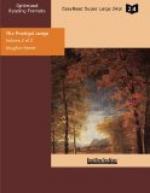“The disgustin’ chattel!” he muttered under his breath, quoting his Uncle Bob, with whom, in theory at least, race feeling was strong. Yancy appeared at the door of the bar and called to him, and as the boy slid from the fence and ran toward him across the yard, the Scratch Hiller sauntered forth to meet him.
“I reckon it’s all right, Nevvy,” he said, “but we don’t know nothing about this here Captain Murrell—as he calls himself —though he seems a right clever sort of gentleman; but we won’t mention Belle Plain.” With this caution he led the way into the tavern and back through the bar to a low-ceilinged room where Murrell and Slosson were already at table. It was intolerably hot, and there lingered in the heavy atmosphere of the place stale and unappetizing odors. Only Murrell attempted conversation and he was not encouraged; and presently silence fell on the room except for the rattle of dishes and the buzzing of flies. When they had finished, the stale odors and the heat drove them quickly into the bar again, where for a little time Hannibal sat on Yancy’s knee, by the door. Presently he slipped down and stole out into the yard.
The June night was pulsing with life. Above him bats darted in short circling flights. In the corn-field and pasture-lot the fireflies lifted from their day-long sleep, showing pale points of light in the half darkness, while from some distant pond or stagnant watercourse came the booming of frogs, presently to swell into a resonant chorus. These were the summer night sounds he had known as far back as his memory went.
In the tavern the three men were drinking—Murrell with the idea that the more Yancy came under the influence of Slosson’s corn whisky the easier his speculation would be managed. Mr. Yancy on his part believed that if Murrell went to bed reasonably drunk he would sleep late and give him the opportunity he coveted, to quit the tavern unobserved at break of day. Gradually the ice of silence which had held them mute at supper, thawed. At first it was the broken lazy speech of men who were disposed to quiet, then the talk became brisk—a steady stream of rather dreary gossip of horses and lands and negroes, of speculations past and gone in these great staples.
Hannibal crossed to the corn-field. There, in the friendly gloom, he examined his handkerchief and felt of the rolled-up bill. Then he made count of certain silver and copper coins which he had in his other pocket. Satisfied that he had sustained no loss, he again climbed to the top rail of the fence where he seated himself with an elbow resting on one knee and his chin in the palm of his hand.
“I got ten dollars and seventy cents—yes, sir—and the clostest shooting rifle I ever tossed to my shoulder.” He seemed but small to have accomplished such a feat. He meditated for a little space. “I reckon when we strike the settlements again I should like to buy my Uncle Bob a present.” With knitted brows he considered what this should be, canvassing Yancy’s needs. He had about decided on a ring such as Captain Murrell was wearing, when he heard the shuffling of bare feet over the ground and a voice spoke out of the darkness.




